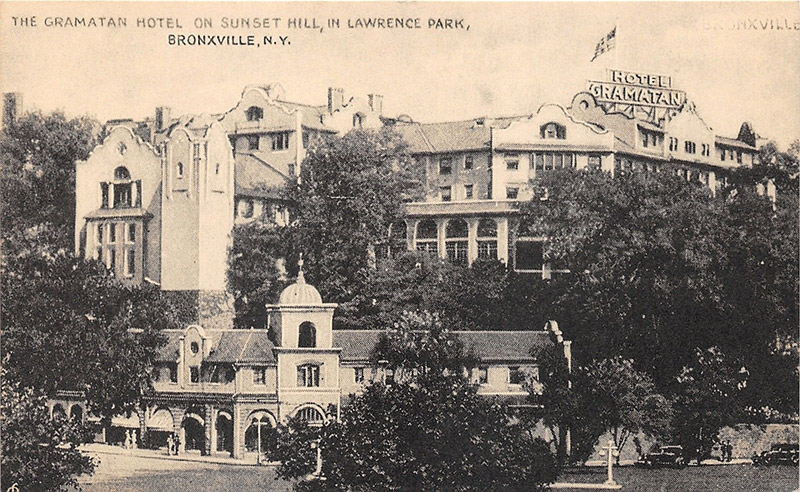–For the Bronxville High School Class of 1998
I. Let Us Now Praise Famous Men
William Lawrence stepped down from the train
to the boulders and bramble of an abandoned farm.
Expecting little he encountered less: "It was
altogether a desolate and forsaken place."
Nevertheless this businessman with vision climbed
a hill for a better view. He was not the first.
Before him was the hardscrabble farm of the Boltons.
And before them the brick-red brown of Gramatan
and the terrifying alabaster of the Swede
named Bronck (Bronck's Mill, Bronck's River, Bronck's Ville).
And Anne Hutchinson with all her pretty ones.
And the Half Moon, that zany cockleshell
captained by Hudson, another of hard-headed vision.
And before that merely the shyness of the wild
on a neck of land all narrow and enough.
But before that, before all of it was the plundering lip
of the Laurentide Glacier where the mountains go under the sea.
What kind of man sets out to found a town?
By all accounts a good man, a family man
for whom wealth was the use of property,
not just its ownership. And happiness
was prosperity combined with virtue.
The Viking say, Cattle die. Kindred die.
But the good name never dies of one who has done well.
William Lawrence saw a city on a hill.
II. The First Pageant, 1915
The white snows of winter fall into the quiet town.
Families from all directions gather in a field.
Lully Lullay, thou tiny little child.
From Midland to the Hill there is no other sound.
They do not hear the European air
fill with shrapnel, they do not see the dead of the Great War
more than all the dead that ever were–
how nations, like trees in a fellowship of fire,
burst one from another into flame. They do not see
the coming unsettlements of the century:
the protocols of speakeasies, the Crash of '29,
Freud and Marx and Darwin come and all but Darwin
gone. Stalin, Mao and America come
and all but America gone. And then the Bomb.
Our citizens sit in their rooms at night alone,
each tending a porthole of kept light: On pillars of fire
our spacemen rise into a stillness near the moon.
TIME tells the Christmas bell from fosse to fen.
TOWN tells the next from hill to glen.
COME bells the third, to Bethlehem again.
In an emerging peal, fierce carillon,
the great bronzing of the Summon Bell,
the baritone behesting of the Jesus Bell,
the smalling of the Justice Goad: ALL WELL,
they claim, GOOD WILL. And TOWN, TIME, DONE.
III. That Existential Rodeo Called Manhattan
The next time you're sitting in impacted traffic
(Why should anything change just because the light turns green?)
or that bewildering array of Nor Permitted Here's
(You wanna go right? You can't go right on Madison.),
the next time a gas station says to Sign up. Pay up. Fill up. Shut up.
think of a town for those who choose to live away
from concrete canyons, a town that lives within its poise.
The next time a truck impresses 27
startled pedestrians with its ability
to stop on a dime, and cabbies with trace amounts
of English and shattered sensibilities
complain with the indiscriminate honking of horns,
think of a town where you can step down from the train
to a Main Street from another century.
True, owning a home here does mean mastering
the lost logic of plumbing lines in old houses,
toilets that speak like run-on sentences,
how to heat a house without burning it down.
It means learning to love your neighbor's leaf blower
and his son's guitar (Is that a rock band or an earthquake?)
and their dog, a Serbian Mountain Climbing Pest.
But having fought the good fight yet another day–
the sump pump of politics, the tyranny of magnates,
the price elasticity of trouble–can any
other place compare when it's time to come home?
IV. Nothing Has a Right to the Space it Occupies
"What's a century?" the glacier asks. "A crack
in time you couldn't slip a sheet of paper into.
Soon enough the work of your architects
will be a rough, ungoverned wilderness again.
It may be the failure of a drumbeat to be heard
or folly, never in short supply, become abundant
or a spell of extreme disease: and your kind becomes
merely one more marsupialled to extinction.
Wolves will den in the oaken bones of your homes,
your churches unroofed by rain, unsteepled by lightning's jacks.
Soon enough," the glacier says, "the whiskery seas
of hurricane will rise and the mountains go under the sea."
How curious then, when nothing lasts: a town
based on a view of human conduct, a village
as a set of values that survives
from those firstings in the fields of 1898.
Here in the depths of May our high school seniors sit
for the pageant that will take them out of themselves
and into the broader fetches of the world.
Whether to engage the high concerns of state and soul,
or the business of building family and character,
or simply to make of their lives small islands of decency,
they go in the grip of a great story slowly told.
In the manner of large balloons may they, the wicker burden
of our future, rise suspended by our loves.
John Barr / from this Archive, Holidays & Special Days


